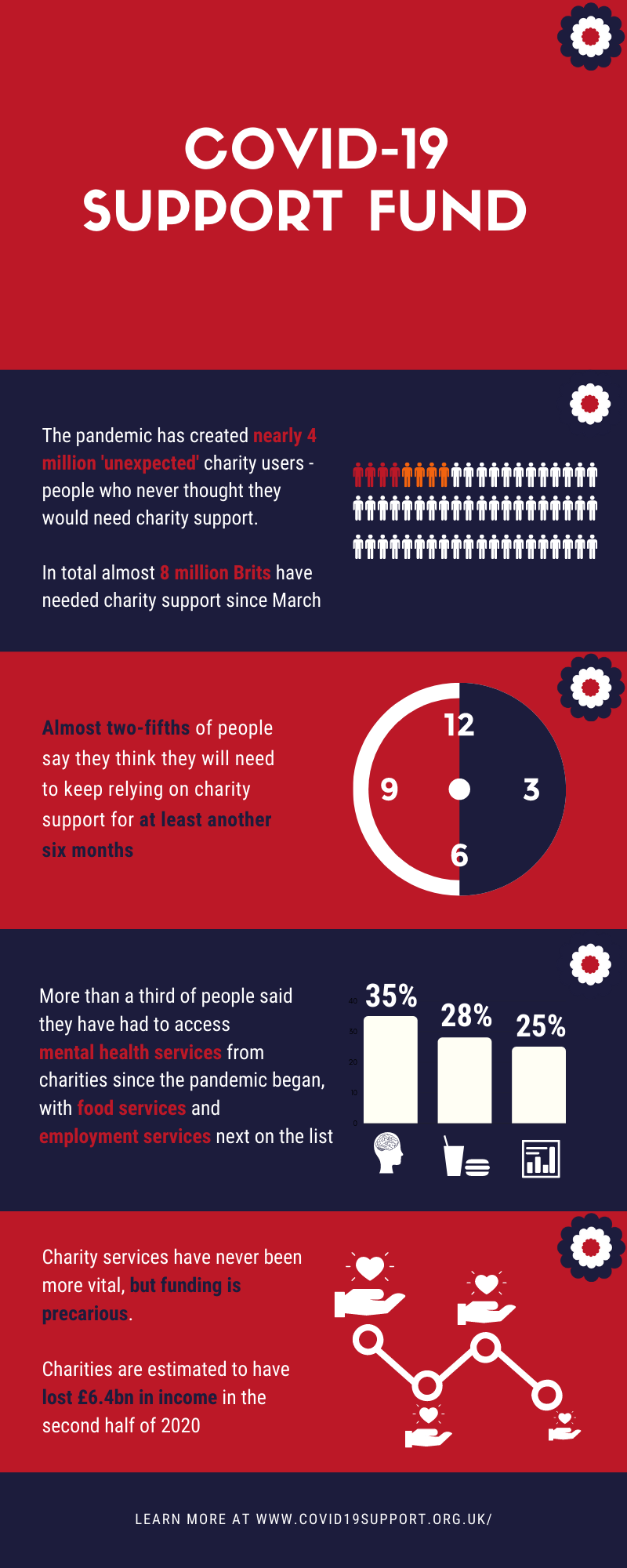New research shows significant dependency on charities revealed since the start of the pandemic
- Almost one in eight (14%) UK adults have received support from a charity since the COVID-19 crisis began in March 2020
- Of those that have received support, nearly 4 million people never expected to need it and three quarters (75%) have been dependent on some form of regular support since the pandemic began
- Now UK adults are more likely to support charities, with two in five (42%) more likely to donate and nearly one in three (30%) more likely to volunteer
Research released today reveals almost one in eight (14%) UK adults have received support from a charity since the COVID-19 crisis began in March 2020. And, more than half (55%) of those that have received support, which equates to 3.9 million UK adults, never expected to need it before the COVID-19 crisis happened.
The research commissioned by The Covid-19 Support Fund, shows a significant proportion (75%) of people using charity services this year have had to do so regularly, exposing how dependent vulnerable people are on charity in the UK. As many as two in five (39%) of these adults say there is no end in sight yet as they expect to need charity support for at least another six months and possibly longer.
This dependency on charity is more likely among adults in full-time employment those aged 18-34[1]. Londoners are also disproportionately dependent on charity compared to elsewhere in the UK, 95% of Londoners who have used charity support have been dependent on it.
Mental health support (35%), food support (28%), and employment support (25%)[2] are the most common types of charity services that people have used. Those aged 18-34 are most likely to have received some form of employment support (35%), while two in five (40%) 35-54s have had mental health support from a charity, which indicates the severity of the mental health impact of this crisis.
When asked to consider the potential impact of the COVID-19 crisis without support from charities, two fifths of those who had support think they would have felt depressed (41%) and roughly the same number anxious (37%). These figures rise to 45% and 40% respectively among 18-34s, evidencing just how vital charity services have been particularly for younger people.
Thankfully, support from charities has helped many people during this difficult time. Many of those who had support say they feel reassured that there are charities there to help during crisis (42%), and relieved that there was someone there for them (39%). Nearly a third (31%) are hopeful for the future, while 27% feel much happier again. This shows just how vital charitable services are in rebuilding people’s lives after crisis.
Overall, two in five (39%) UK adults think they have a better understanding of how charities in the UK can help people since the COVID-19 crisis began. While there’s been a boom in the recognition of support from charities, as two thirds (67%) of UK adults say they are now more likely than before to seek charity help, people are also more likely to support charities since the pandemic began, with two in five (42%) saying they are more likely to donate and nearly one in three (30%) would be more likely to volunteer.
However, despite these promising findings, three in five (58%) are concerned about the drop off in funding that charities are experiencing because of the COVID-19 crisis. And they’re right to be concerned by this, as analysis by Pro Bono Economics predicted a £6.4bn loss of income over the six months to December 2020 for the UK’s 170,000 charities, leaving one in 10 potentially facing bankruptcy[3].
Notes for Editors
Research conducted by Opinium on behalf of the Covid-19 Support Fund between 1st – 3rd December 2020. Sample size of 2,000 UK adults, results are weighted to be nationally representative
Please contact Third City with any media enquiries at [email protected]
[1] Adults in full-time employment (20%) and more than a quarter (27%) of those aged 18-34
[2] This does not include Government support like furlough pay or business interruption loans
[3] https://www.theguardian.com/society/2020/nov/12/devastating-loss-funds-uk-charities-count-cost-covid
Yvonne Braun, Executive Lead at the Association of British Insurers for the Covid-19 Support Fund
This research paints a worrying picture of how dependent people across the UK have been on charity support since the beginning of this crisis. The support people have needed hasn’t been a one-off, instead many have required regular help from these organisations. And many people would have suffered more without the help that many charities have provided them with this year. It is also clear that without charities, the emotional impact of not having any support could have worsened this crisis even more.”
That’s why it is so crucial that business communities come together to financially support the vital work of charities now. We’re proud that the Covid-19 Support Fund is enabling charities to carry out their vital work in this unprecedented time, and we’re grateful to all the firms across the insurance and long-term savings industry who have generously donated this year.”
